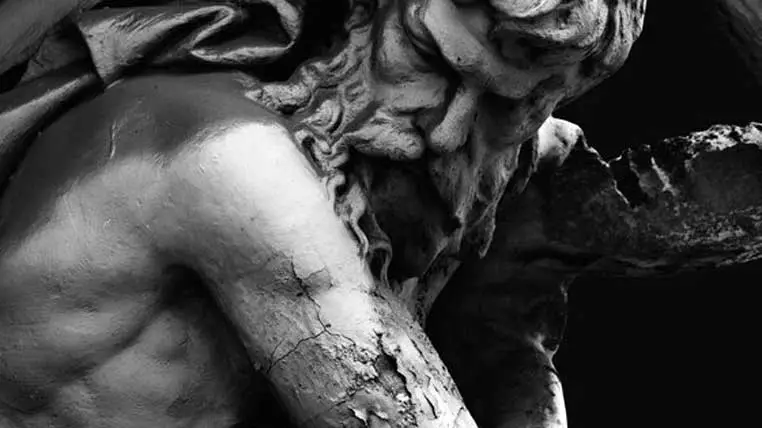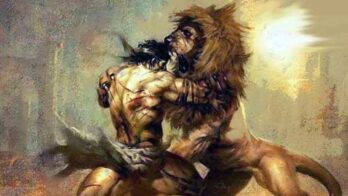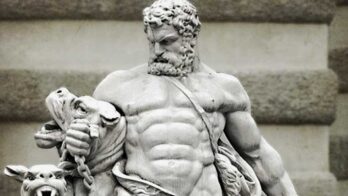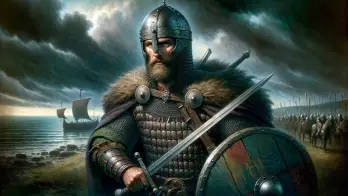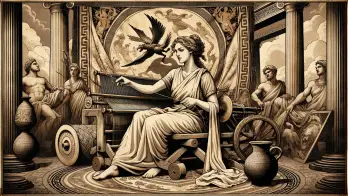Hephaestus is the god of fire, metalworking, and craftsmanship, and he is known for his exceptional skills as a blacksmith, artisan, and architect.
Unlike other gods and goddesses who embody physical perfection and beauty, he is depicted as a strong, muscular figure with a beard, holding a hammer and tongs, and wearing a pointed hat.
However, he has a physical disability – he is lame, meaning he has a limp or cannot walk without assistance – an essential aspect of his character, shaping his personality, relationships, and actions throughout his life.
The Birth of the Greek God of Fire
Hephaestus was born to Zeus and Hera, making him a member of the Olympian pantheon.
However, according to some accounts, Hephaestus was born from Hera alone, without the involvement of Zeus, as an act of revenge against her unfaithful husband.
In other versions of the myth, Hephaestus was born as a healthy baby but was thrown off Mount Olympus by his mother because of his deformity, and he landed on the island of Lemnos, where he was raised by sea nymphs.
Despite his difficult start in life, Hephaestus developed exceptional metalworking and craftsmanship skills, becoming the world’s finest blacksmith.
Genealogy
Despite being born to Hera alone, Hephaestus had several relationships with other gods and goddesses.
His parents were Zeus and Hera, the king and queen of the gods, but his birth was not conventional.
According to one myth, Hera gave birth to him without the help of Zeus, which made him an outcast among the gods. This may have contributed to his eventual rejection by his mother, who threw him out of Mount Olympus.
Hephaestus had several siblings, depending on the mythological tradition. He had a strained relationship with some of them, especially with Ares, the god of war, who was known to mock him for his physical disability.
On the other hand, he had a close relationship with Athena, the goddess of wisdom and warfare, who taught him metalworking and helped him improve his craft.
In other Greek myths and legends, Hephaestus had several other brothers and sisters, including Hebe, the goddess of youth and cupbearer of the gods; Eileithyia, the goddess of childbirth; Dionysus, the god of wine, and Persephone, the queen of the underworld.
Hephaestus had two wives, the first of whom was Aphrodite, the goddess of love and beauty. However, their marriage was turbulent, as Aphrodite was known to be unfaithful.
The god of fire, metalworking, and craftsmanship was aware of her infidelity and decided to take revenge by trapping her and her lover, Ares, in a golden net he had crafted himself.
This event is known as the ‘Affair of the Net.’
Hephaestus’ second wife was Aglaia, one of the three Charites (Graces), goddesses of beauty, charm, and creativity.
Together they had three children: Eucleia (goddess of good repute), Euthenia (goddess of prosperity), and Philophrosyne (goddess of friendliness and kindness).
One of Hephaestus’ most famous children was his son, Erichthonius, who was born from his union with Gaia, the goddess of the earth.
Erichthonius was known for his intelligence and strength and was considered one of the wealthiest men in Athens. He was skilled in metalworking and used his father’s techniques to create intricate designs and decorations.
The god also had a daughter, Eukleia (goddess of cleanliness), who was responsible for the cleanliness of the altars and offerings made to the gods and was associated with the Olympic Games.
Another of Hephaestus’ children was his son, Periphetes, who was known for his immense strength and was called the “Club Bearer.”
Periphetes wielded a large club that was made by his father and was said to be nearly as strong as Hephaestus himself. He used this club to fight off enemies and protect his fellow gods and mortals.
Finally, Hephaestus’ children also included his famous twin sons, Palaimon and Thelemon, considered the patron gods of sailors and fishermen.
They were known for their knowledge of the sea and were often depicted riding on dolphins or using a throwing net to catch fish.
The Artisan of Technology and Architecture
In Greek mythology, Hephaestus was celebrated as a master craftsman and metalworker of unparalleled renown. He was responsible for creating many groundbreaking technological advancements of his time, including weapons, armor, and tools.
Moreover, he patronized artisans, sculptors, and architects, who looked up to him for guidance and inspiration in their creative pursuits.
The god’s exceptional skill in forging metal was widely admired, and he was credited with inventing the anvil, a crucial tool for shaping and molding metal into various forms. He was also recognized as the inventor of the throwing net used in hunting and fishing.
In addition to his metalworking expertise, Hephaestus was renowned for his architectural brilliance.
He was responsible for designing and constructing some of the most impressive structures in Greek mythology, including the palaces of the gods and the weapons used in battles.
The god’s famous workshop was situated on the volcanic Hephaestus Island, which was believed to be his home and the center of his artistic and technical pursuits.
According to legend, the workshop was filled with ingenious machines, tools, and devices, powered by the god’s magical fire.
Myths and Legends
Hephaestus was a pivotal figure in numerous myths and legends, and his relationship with his family was central to many of these stories.
For instance, in the myth of the Trojan War, the god of fire found himself torn between his loyalty to his family and his duty to the gods. His brother Ares led the Greeks against the Trojans, favored by Hephaestus’s wife, Aphrodite.
Another popular myth involving Hephaestus was his rivalry with Prometheus, the god who stole fire from the gods and bestowed it upon humanity.
According to the legend, Hephaestus was enraged by Prometheus’s audacity and sought revenge by creating Pandora, the first woman on earth, who would bring suffering and chaos to humanity.
Hephaestus and Athena
Several sources recount the tale of Hephaestus and Athena’s marriage. According to the myth, Zeus offered the goddess as a reward to Hephaestus for his help in giving birth.
Using a sickle, Hephaestus split up Zeus’ head, releasing Athena. However, Athena vanished before she could enter the marital bed and never became Hephaestus’ wife.
Despite this, the ancient Greeks venerated the two gods together, built temples, and held festivals in their honor.
Both Hephaestus and Athena were believed to possess healing powers, and the place where the god of fire fell from Olympus, the Lemnian Earth, was considered a sacred location where the sick could be healed of their ailments.
The strong bond between Hephaestus and Athena is also evident in the abundance of paintings and sculptures depicting the god in most temples dedicated to the goddess of the hunt in Athens.
Additionally, no city was more renowned in Greece than Athens, the city devoted to the goddess of wisdom. Every four years, grand celebrations were organized in which participants engaged in contests, races, dancing, music, and poetry.
These festivals were called Panathenaia, named after the goddess. In Athens, the verses of the blind old poet Homer were recited and transcribed.
In a famous marble amphitheater, the Odeon, beautiful songs were sung that delighted the ears of the art-thirsty crowds.
Hephaestus and Aphrodite
Despite his physical frailty and lameness, Hephaestus took as his wife the most beautiful of all goddesses, Aphrodite. However, she was unfaithful to him, having affairs with his brother Ares, the god of war, and other gods and mortals.
According to legend, Hephaestus discovered Aphrodite’s infidelity with the help of Helios. Overwhelmed with grief, the god created an invisible net and pretended to leave home.
Once Hephaestus left, Ares appeared in his forge and took the goddess in his arms to kiss her, and the net fell on them, trapping them both.
Hephaestus returned and dragged them, still entangled in the net, to the top of Mount Olympus to humiliate them in front of the other gods:
Oh, mighty Zeus and you, immortals, come, come quickly so that you can see them, too, and despise them! Because I am a fool, the beautiful Aphrodite decided to mock me and love Ares, who is more handsome, skillful, and wicked.
The gods, coming in haste, began to laugh when they saw Ares and Aphrodite wriggling like fish in a tub, until the fire god finally freed them, to the amusement of all.
Ashamed, the goddess fled to hide on the island of Cyprus, while Ares fled to Thrace, a wild and cold country, to escape from scorn.
The Birth of Pandora
According to the myth, Zeus, the ruler of the gods, tasked Hephaestus with creating a stunning woman named Pandora from clay. Athena breathed life into Pandora, and the gods endowed her with numerous talents and attributes.
Zeus bestowed Pandora upon Epimetheus, Prometheus’ brother, as a bride. Along with Pandora, Zeus gave Epimetheus a mysterious box, or jar, as a wedding gift and instructed him never to open it.
Pandora’s curiosity eventually got the better of her, and she opened the box, unleashing all the world’s evils, such as sickness, war, and death.
In some versions of the myth, hope remained at the bottom of the box, while in others, it was trapped inside.
Over the years, the myth of Pandora’s Box has been interpreted in various ways.
One interpretation views it as a metaphor for the human condition, where the box represents the world, and the evils released from it symbolize the difficulties and challenges we all face in life.
This interpretation suggests that the myth serves as a reminder that life is not always easy, and we must learn to accept and cope with the difficulties that come our way.
Another interpretation perceives the myth as a commentary on the role of women in society.
In this reading, Pandora embodies the archetypal female figure, beautiful, intelligent, and talented, but ultimately brings destruction to the world through her curiosity and disobedience.
Another common interpretation of the myth is that it represents the struggle between the forces of good and evil.
In this reading, the box symbolizes the human heart, capable of both good and evil. The evils released from the box are viewed as the darker aspects of human nature, while the hope at the bottom of the box symbolizes the possibility of redemption and renewal.
Symbols
Hephaestus is frequently depicted with several symbols that represent his domains and skills.
The most prevalent symbol is the hammer, used for forging and shaping metal. The hammer is often depicted in conjunction with an anvil, utilized as a work surface for metal forging. The anvil is usually shown with a single horn, where the metal is shaped.
Another common symbol is the tongs, which hold hot metal while it is forged. Tongs are often depicted with the hammer and anvil as part of Hephaestus’ tools.
Hephaestus is also associated with the forge, a place where metal is heated and shaped. The forge is frequently depicted as a hearth with bellows attached to it.
The Cult of Hephaestus
The cult of Hephaestus initially spread in the volcanic regions of Asia Minor and later only expanded to the Greek regions, passing through the Ionian islands.
Hephaestus was especially venerated on the island of Lemnos, where local tradition placed his second fall. However, numerous other islands disputed the honor of hosting the legendary forge of the god.
Possible locations of Hephaestus’ workshop appear in Vergil’s Georgics and Aeneid. Among the potential locations are Lipari, Imbros, and Sicily islands.
As a form of veneration, the Ancient Greeks placed small statues of the god as a dwarf on the ground.
At Ancient Theory we only use trusted sources to document our articles. Such relevant sources include authentic documents, newspaper and magazine articles, established authors, or reputable websites.
- Jay Dolmage - Breathe upon Us an Even Flame": Hephaestus, History, and the Body of Rhetoric. Taylor & Francis, 2006.
- Hephaestus. theoi.com.
- Fritz Graf - Hephaestus. Oxford Classical Dictionary. [Source]
- Hephaestus - britannica.com. [Source]
- Hephaestus, Greek God of Blacksmiths and Fire. greekmythology.com.
- Philip Elliot Slater - The Glory of Hera: Greek Mythology and the Greek Family. Princeton, New Jersey: Princeton University Press, 1968.
- Sasha Blakeley - Hephaestus, Greek God of Fire & Blacksmiths. study.com.
